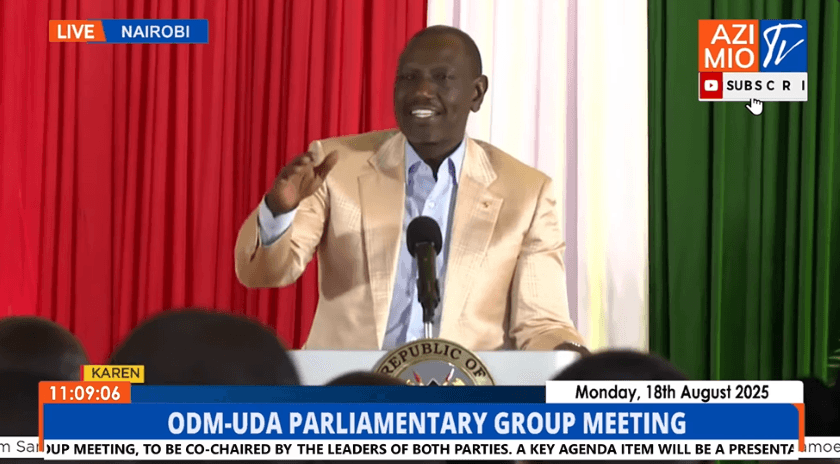President William Ruto has told lawmakers and the public that he knows his government is unpopular, but he says big reforms must continue so Kenya can grow. Speaking at a joint UDA–ODM parliamentary meeting in Karen, Nairobi, Ruto said the push for changes such as the Social Health Authority (SHA), new housing plans and reforms in education and agriculture will be hard now but will pay off later.
“I can assure you, even if Raila Odinga were president today, he would be implementing SHA, housing, reforms in education, and agriculture. He would face the same difficulties I am facing now.”
Ruto said, arguing the reforms are not personal but needed for the country. He added that the problems he faces are “self-imposed” because he chose difficult but necessary changes.
Ruto told MPs to stop what he called “extortion” that slows progress. He accused some lawmakers of taking money to block key laws and said he would pursue anyone involved. “Do you, for example, know that a few members of your committee collected Sh10 million so that you don’t pass that law on anti-money laundering? Did you get the money?” he asked, a claim that has intensified calls for investigation.
Why this matters to you is simple. The SHA aims to change how Kenyans access health care. It replaces the old NHIF model with a new Social Health Insurance Fund and a regulator (SHA) that the government says will deliver better coverage. The Health Ministry says millions have registered — figures released show broad sign-ups — but the rollout has also faced criticism and technical problems.
There are real concerns that explain some of the anger. An Auditor-General review flagged irregular procurement and unbudgeted spending linked to SHA systems, raising questions about transparency and value for money. Those gaps feed public doubt: when people see money spent without clear results, trust falls and protests grow.
So what should Kenyans expect next? First, the state will likely pursue the anti-money-laundering claim. If evidence exists, investigators could open files and arrest suspects. Second, the SHA rollout will continue while officials try to fix technical issues and answer concerns about procurement and service delivery. Third, politics will intensify: Ruto says reforms must press on, but critics will keep asking for faster benefits and clearer answers.
Ruto asked Kenyans for time and patience. He warned that avoiding the hard choices would keep the country stuck. “If I had not implemented the new funding model or housing, I would be very popular, but the country would gain nothing,” he said. The statement is a blunt promise: short-term pain, long-term gain.
That message will land differently across the country. For those who struggle to pay school fees or hospital bills today, rhetoric of future rewards rings thin. For business leaders and investors, clarity on spending, anti-corruption action and steady project delivery will matter more than speeches. In short, Ruto’s test is not only political: it is administrative. Deliver the services, repair trust, and the politics will follow.
Kenyans will watch whether the president’s promise turns into faster clinics, stable payments for care, and visible jobs. Until then, the debate over priorities — reform now or comfort now — will shape the run-up to elections and the daily life of ordinary households.
Featured image via screengrab








